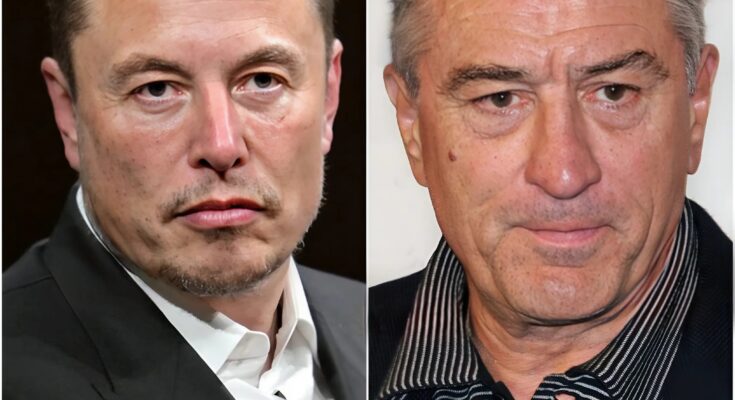Elon Musk as one of the most polarizing figures in the tech world, the billionaire entrepreneur and CEO of X (formerly Twitter) has reportedly removed Robert De Niro, the legendary actor, from the platform. Musk’s reasoning? The claim that there is “no space for his woke agenda” on X.
The decision has sent shockwaves across both Hollywood and Silicon Valley, with many questioning whether Musk’s bold statement is a stand for free speech or an act of censorship. As always, the truth lies somewhere in the murky middle.
De Niro, known for his outspoken political views, has never shied away from sharing his progressive ideology. Over the years, the actor has been vocal about his support for liberal causes, often calling out political figures, including former President Donald Trump. His fiery comments have garnered both admiration and criticism, making him a divisive figure in the public eye.
But why would Musk, a self-proclaimed “free speech absolutist”, target someone like De Niro? Sources close to Musk suggest that the decision stems from a recent series of posts made by the actor. These posts reportedly criticized Musk’s handling of X’s content moderation policies, accusing him of enabling harmful narratives under the guise of free speech. De Niro’s remarks, while not overly inflammatory, were enough to catch the attention of Musk, who viewed them as an attack on his leadership.
In his characteristic style, Musk didn’t hold back. He allegedly tweeted, “X is a platform for free thought, not for pushing woke agendas disguised as activism. Robert De Niro, with all due respect, has crossed a line.” Shortly after, De Niro’s account was reportedly removed, sparking outrage among his fans and followers.
Critics of Musk have called the move hypocritical, pointing out that the billionaire has long championed free expression, even when it bordered on controversy. By silencing De Niro, they argue, Musk is betraying his own principles. Others, however, see it differently. Supporters of Musk believe that De Niro’s rhetoric had crossed into territory that stifled diverse perspectives, which Musk claims to protect.
This isn’t the first time Musk has been accused of wielding his power over X in controversial ways. Since acquiring the platform, he has made sweeping changes, including the reinstatement of previously banned accounts and a crackdown on what he deems “woke culture.” These moves have reshaped the platform into what Musk describes as a “town square for debate” but have also alienated a significant portion of its user base.
For his part, De Niro has not remained silent. The actor issued a statement through his publicist, saying, “Silencing dissent only strengthens it. I stand by my words and will continue to speak up for what I believe in, whether I’m on X or not.” His words were met with applause from Hollywood elites and liberal activists, who have rallied behind him, accusing Musk of being a bully and a hypocrite.
The fallout from this incident is emblematic of the larger cultural war playing out in today’s society. On one side, figures like Musk argue for a platform free from ideological constraints, claiming that “woke agendas” suppress open dialogue. On the other, personalities like De Niro believe that unchecked platforms can become breeding grounds for hate speech and misinformation. Both sides make compelling arguments, leaving the public divided.
The question remains: who benefits from this clash of egos? For Musk, it’s an opportunity to solidify X as a bastion for his vision of free speech. For De Niro, it’s a chance to embody the role of a silenced artist fighting against perceived authoritarianism. But for the average user, it’s just another reminder of how much control powerful individuals have over public discourse.
As the debate rages on, one thing is clear: the Musk-De Niro feud is more than just a personal spat. It’s a reflection of the growing tensions between tech moguls and the cultural elite, with both sides vying for influence over how we communicate and what we believe.



